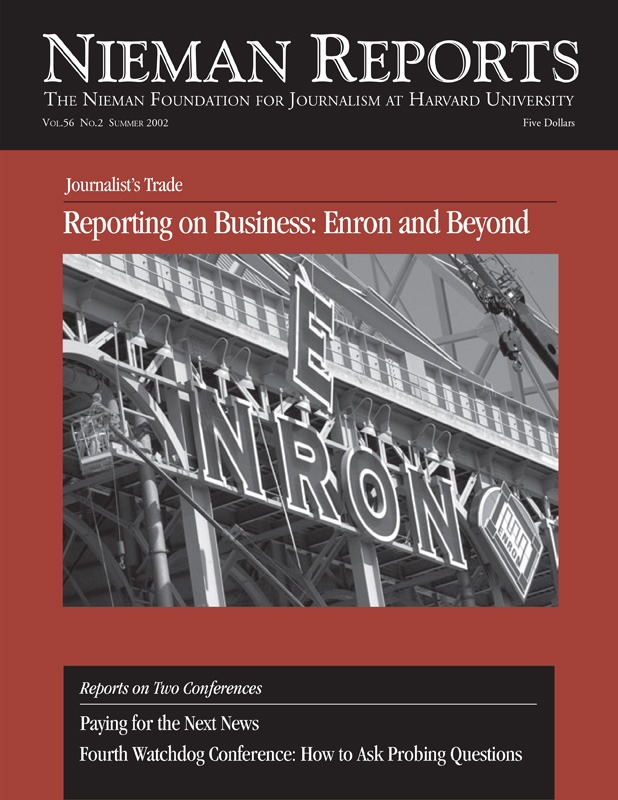
Reporting on Business: Enron and Beyond
Enron’s extraordinary collapse leapt into public view with banner headlines befitting the precipitous fall of a once mighty power. This was a company that not too long before its demise had been the business media’s poster child, praised for its “innovative” practices and consistently listed among the top American corporations. During these heady times, only a few reporters followed leads that eventually took readers past the media’s mostly laudatory words and into the reality of a company whose foundation was crumbling. – Melissa Ludtke, Editor
In March, journalists from 24 countries and the European Union at the Salzburg Seminar in Austria discussed the impact market pressures are having on the quality of journalism. At the conclusion of the meeting, a statement was written and agreed to by those who participated. This statement follows:
I. Preamble
journalists and supporters of journalism attending the Salzburg Seminar Session 396, March 20-27, 2002, in Salzburg, Austria. The topic: The decline of the news media’s role as a public trust and the effects of that phenomenon on its obligations to civil society. Our discussions revealed that journalists and their supporters from many countries share a strong conviction that market pressures are undermining the quality of journalism; specifically, as news organizations preserve high profit levels by reducing newsgathering resources and neglecting journalism in the public interest, the fundamental role of the press to inform and empower citizens is endangered. These concerns are the motivation for this statement, which we hope will prompt further consideration, discussion and action around the world.
A free and independent press is essential to human liberty. No people can remain sovereign without a vigorous press that reports the news, examines critical issues, and encourages a robust exchange of ideas. In recognition of the vital role of the press in society, many countries extend it special legal protections under constitutions or legislatively enacted statutes. These protections are unique, for they safeguard print, broadcast and online media organizations against government interference and censorship.
Where this special status has been accorded the press, news organizations have been held to a high standard of public service and public trust. Over time, this ideal has become a bedrock of journalism, an enduring tradition by which a free press has been a powerful force for progress and informed citizen participation in society.
Historically, threats to press freedoms have been political in nature. At the start of the 21st century, however, a new kind of threat emerges that, if continued, will endanger the freedoms guaranteed to the press and put at risk the sovereignty of the citizens.
The nature of the press as a commercial enterprise has changed significantly. The emergence of media conglomerates and intense market competition are creating new organizational priorities in which profit growth is replacing public service as the principal mission. Sustaining profit growth often requires reducing the resources for newsgathering, thereby diminishing the role of the news media as a public trust.
Business priorities are encouraging the blending of news and entertainment as a strategy to build audiences and ratings. This trend, most noticeable worldwide in television, has led to a reduction in serious news coverage and may be responsible for a decline of public confidence in this medium as an essential source of information.
Finally, a shrinking commitment to both domestic and international news means that news organizations are missing opportunities to connect people and ideas globally at the very time technology has made such connections increasingly possible.
This international group of journalists and supporters of press freedom calls on the leaders of news organizations worldwide to recognize the need for a wiser balance between business goals and public service responsibilities and to reaffirm their commitment to journalism and the role of a free press in sustaining human liberty.
II. Concerns About Journalism
We recognize that news organizations function in a competitive, multimedia environment, and that financial strength is essential for journalistic excellence and independence. However, an unbalanced emphasis on profits and financial growth weakens the foundation of journalism as a public trust. We are convinced that the growing imbalance in the priority given to the quality of journalism and profit growth ultimately impairs citizens’ ability to participate fully in their communities. We recognize that neglecting the public interest erodes public support for legal guarantees of the freedom of the press to report the news. We conclude that market forces and other pressures are causing the following problems:
1) For citizens and society
2) For journalism content and influence
3) For news media organizations
III. Proposals for Consideration
To address these concerns, we encourage the press and the public to consider the following suggestions in communities and situations where they may apply:
Endorsed by Salzburg Seminar Session 396 participants from the following nations and regions: Argentina, Armenia, Bosnia, China, Egypt, European Union, Colombia, Germany, Hungary, India, Israel, Italy, Latvia, Pakistan, Palestine, Philippines, Saudi Arabia, South Africa, Spain, Thailand, Turkey, Ukraine, United Kingdom, United States of America, Yugoslavia
I. Preamble
journalists and supporters of journalism attending the Salzburg Seminar Session 396, March 20-27, 2002, in Salzburg, Austria. The topic: The decline of the news media’s role as a public trust and the effects of that phenomenon on its obligations to civil society. Our discussions revealed that journalists and their supporters from many countries share a strong conviction that market pressures are undermining the quality of journalism; specifically, as news organizations preserve high profit levels by reducing newsgathering resources and neglecting journalism in the public interest, the fundamental role of the press to inform and empower citizens is endangered. These concerns are the motivation for this statement, which we hope will prompt further consideration, discussion and action around the world.
A free and independent press is essential to human liberty. No people can remain sovereign without a vigorous press that reports the news, examines critical issues, and encourages a robust exchange of ideas. In recognition of the vital role of the press in society, many countries extend it special legal protections under constitutions or legislatively enacted statutes. These protections are unique, for they safeguard print, broadcast and online media organizations against government interference and censorship.
Where this special status has been accorded the press, news organizations have been held to a high standard of public service and public trust. Over time, this ideal has become a bedrock of journalism, an enduring tradition by which a free press has been a powerful force for progress and informed citizen participation in society.
Historically, threats to press freedoms have been political in nature. At the start of the 21st century, however, a new kind of threat emerges that, if continued, will endanger the freedoms guaranteed to the press and put at risk the sovereignty of the citizens.
The nature of the press as a commercial enterprise has changed significantly. The emergence of media conglomerates and intense market competition are creating new organizational priorities in which profit growth is replacing public service as the principal mission. Sustaining profit growth often requires reducing the resources for newsgathering, thereby diminishing the role of the news media as a public trust.
Business priorities are encouraging the blending of news and entertainment as a strategy to build audiences and ratings. This trend, most noticeable worldwide in television, has led to a reduction in serious news coverage and may be responsible for a decline of public confidence in this medium as an essential source of information.
Finally, a shrinking commitment to both domestic and international news means that news organizations are missing opportunities to connect people and ideas globally at the very time technology has made such connections increasingly possible.
This international group of journalists and supporters of press freedom calls on the leaders of news organizations worldwide to recognize the need for a wiser balance between business goals and public service responsibilities and to reaffirm their commitment to journalism and the role of a free press in sustaining human liberty.
II. Concerns About Journalism
We recognize that news organizations function in a competitive, multimedia environment, and that financial strength is essential for journalistic excellence and independence. However, an unbalanced emphasis on profits and financial growth weakens the foundation of journalism as a public trust. We are convinced that the growing imbalance in the priority given to the quality of journalism and profit growth ultimately impairs citizens’ ability to participate fully in their communities. We recognize that neglecting the public interest erodes public support for legal guarantees of the freedom of the press to report the news. We conclude that market forces and other pressures are causing the following problems:
1) For citizens and society
- Inadequate access to diverse sources of information.
- Decline in public understanding of current affairs.
- Decline in citizen participation in community life.
- Diminishment of citizens’ political authority.
- Improper confluence of media ownership and political interests.
2) For journalism content and influence
- Decline of diverse and comprehensive news produced in the public interest.
- Neglect of audiences that are not valued by advertisers.
- Compromising of editorial integrity for commercial purposes.
- Encroachment of entertainment into news coverage.
- Shrinking impact of news organizations as audiences dwindle.
3) For news media organizations
- Concentration of ownership and creation of monopolies.
- Vulnerability to the imperatives of stock markets and other financial interests.
- Increasing tendency of multimedia conglomerates to use news resources to promote commercial interests.
III. Proposals for Consideration
To address these concerns, we encourage the press and the public to consider the following suggestions in communities and situations where they may apply:
| 1) | Encourage diverse news media ownership and urge media companies to commit to providing quality journalism to all communities they serve. | ||||||||||
| 2) | Ensure that television networks and radio stations provide quality news programs as part of their societal obligation to the public airwaves. | ||||||||||
| 3) | Help citizens evaluate the quality of the news they receive and express their views so that their voices may be heard. | ||||||||||
| 4) | Use journalism to enhance citizens’ ability to participate in community life. | ||||||||||
| 5) | Call on companies that own news organizations to:
| ||||||||||
| 6) | Ensure that entertainment content does not compromise news coverage. | ||||||||||
| 7) | Keep a clear separation between advertising and news content. All advertising should be clearly labeled. | ||||||||||
| 8) | Reaffirm journalism values of accuracy, fairness and balance; maintain the roles of the press as watchdog and voice for citizens. | ||||||||||
| 9) | Promote professional standards of excellence in journalism education. | ||||||||||
| 10) | Foster media education of young people in schools and through media. |
Endorsed by Salzburg Seminar Session 396 participants from the following nations and regions: Argentina, Armenia, Bosnia, China, Egypt, European Union, Colombia, Germany, Hungary, India, Israel, Italy, Latvia, Pakistan, Palestine, Philippines, Saudi Arabia, South Africa, Spain, Thailand, Turkey, Ukraine, United Kingdom, United States of America, Yugoslavia


